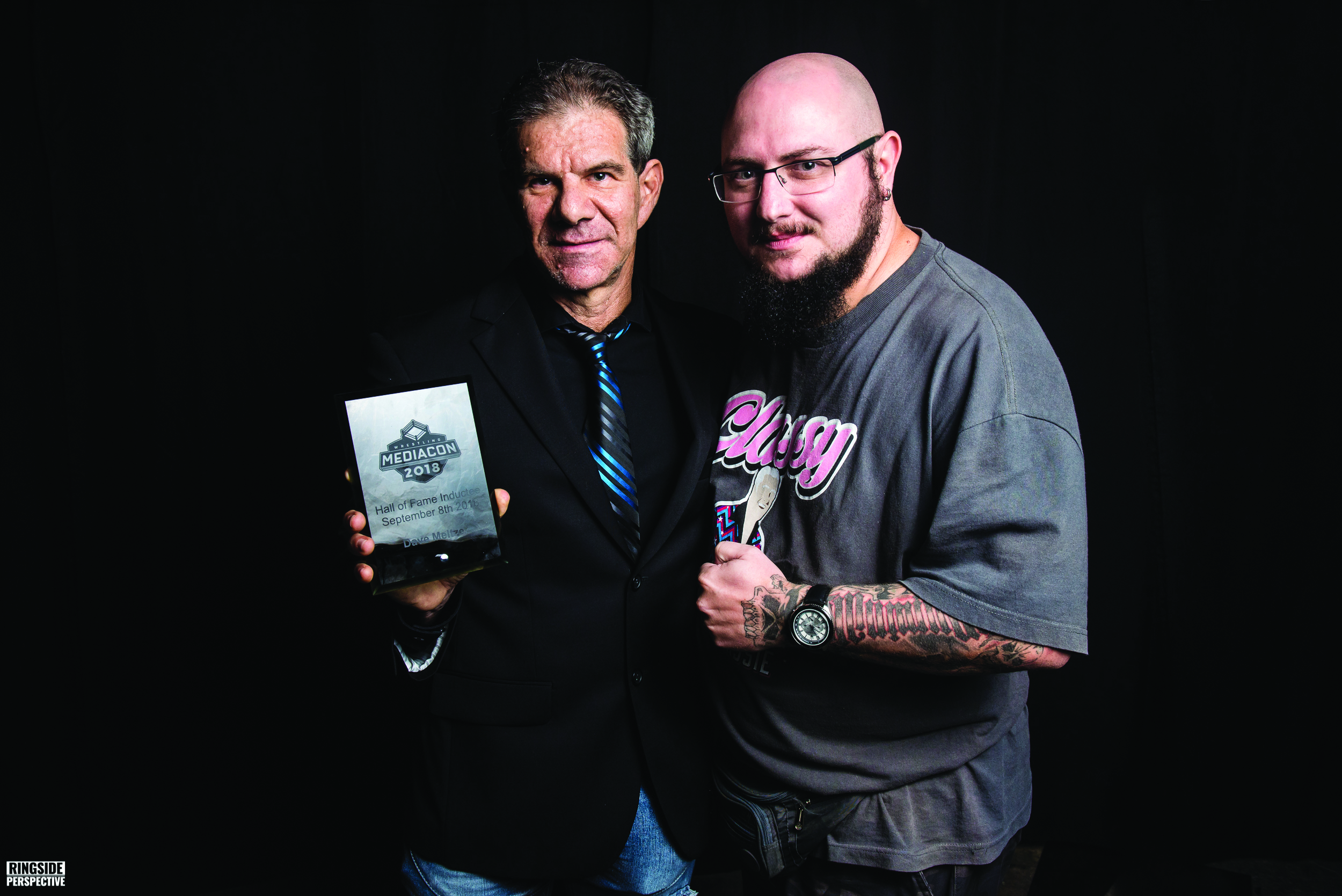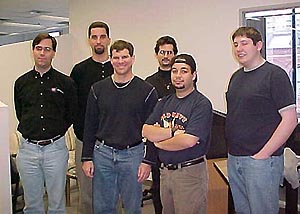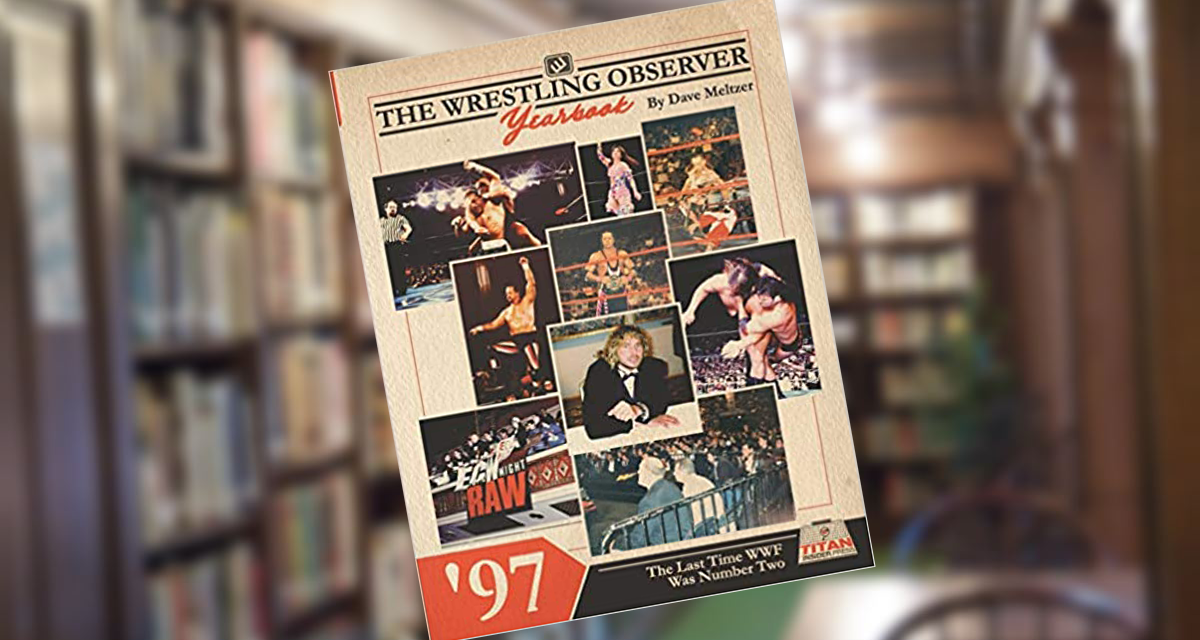Do you remember the year 1997?
For this writer, it was the year I entered high school (and my school photo still makes me grimace!). The year I heard the tragic news of the death of Princess Diana after getting back from a WWE (World Wrestling Entertainment) house show on the same night. The movie Titanic was released (I’m a bit embarrassed to say I saw this twice in the theater) and the first book in the Harry Potter series was published.
And if you are a pro wrestling fan, the year 1997 was as big as it gets. Pro wrestling journalist/author Dave Meltzer reports on and analyzes it all in his new book, The Wrestling Observer Yearbook 1997: The Last Time WWF was Number Two, out now from Titan Insider Press.
Meltzer started The Wrestling Observer Newsletter (WON) in 1982. Later that same decade, he started putting together yearbooks that would go out to the newsletter’s subscribers. He stopped doing the yearbooks in 1990. At the time, Meltzer says the yearbooks were “built around the annual awards” infamously given out by the newsletter which include such categories as: Wrestler of the Year, Feud of the Year and the always eagerly anticipated Match of the Year. In addition, Meltzer would include some of the biggest stories of that particular year.
In this never before released and for the first time a printed yearbook for 1997, there are 39 chapters on the year’s biggest stories in pro wrestling and Mixed Martial Arts (MMA) featuring all the material on each subject from the issues of the WON in 1997. There are also these additional chapters:
- Bits and Pieces
- WWF (World Wrestling Federation, now WWE) Ins and Outs
- WCW (World Championship Wrestling) Ins and Outs
- Business Analysis
- Supercard Summary
- The Big Shows Directory: Domestic PPV (Pay-per-view) Events
- The Big Shows Directory: Major International Events
- 1997 PPV Drawing Cards
- 1997 Final Match Quality Ratings
- Wrestling Observer Newsletter Awards
This book project came about as a partnership between Meltzer and Inside the Ropes (ITR). Titan Insider Press is the publishing arm of ITR.

Inside the Ropes Wrestling Magazine editor Dante Richardson (right) with Dave Meltzer.
“I’ve known Dave for a while,” explained Dante Richardson, the editor of ITR’s recently launched magazine and the head of editorial at Titan Insider Press, in an email to SlamWrestling.net. “We’ve chatted back and forth for years about various goings on in the business and we worked together a couple of years ago when he came to England to be inducted into a wrestling media hall of fame. He was a big supporter of me when I released the Titan book series and a valuable source of knowledge.”
Richardson continued. “To me, as great a resource as the WON is online, it’s quite hard to find specific stories and get the full picture of them, as often things play out over several weeks. I also knew that wrestling fans would want a physical book they could hold in their hands and keep on their shelves as a reference guide. So, I approached Dave with the idea, he was really into it, and we were off to the races.”
According to Richardson, the plan is to release three or four of Meltzer’s yearbooks each year. The yearbooks will not necessarily run chronologically. “I know that might be annoying for people who want them to all line up on the shelf, but we will get the gaps filled eventually, don’t worry,” remarked Richardson. Richardson says the next yearbook to be released will be for the year 1993 and after that “a lot of it depends on what fans ask for.” ITR is also interested in going beyond the yearbooks and releasing books on Meltzer’s match reviews and guides to a pro wrestling promotion’s PPVs. Meltzer says he hasn’t ruled out doing a third Tributes books. (The first two books were compilations of some of the obituaries he has written for figures in pro wrestling in the newsletter.)
Highlights of the 1997 yearbook for this reader included the chapters: “The Future of No Holds Barred Fighting,” “ECW (Extreme Championship Wrestling) Arrives on Pay-per-view,” “Bret Hart vs. Shawn Michaels” (this chapter explores the tension/altercations leading up to their feud at Survivor Series in 1997 that resulted in the Montreal Screwjob), “The Death of Plum Markio,” “Arn Anderson Retires,” “The Life and Death of Brian Pillman,” “The Montreal Screwjob,” and “Fan Riots.”
The book is indeed a great resource and a nostalgic read. It’s a hefty tome coming in at 418 pages that is all text and no photos (except for the front and back cover), so this isn’t a book you are going to read all in one day. If I could offer some criticisms, this reader would have appreciated some photos to break up the ample text, an introduction to the book by Meltzer analyzing 1997 and tying everything together and some updates/personal insights at the end of each chapter. These additions would have made for a more specialized and stronger read. But at the same time the book as it exists is a reminder of the admirable, maybe even impossible, amount of prose that Meltzer has devoted and still continues to devote to pro wrestling/MMA each year.
For Meltzer, there are two big events in pro wrestling that stick out to him for the year 1997. The first would be the death of Pillman on October 5, 1997. Meltzer writes emotionally about this subject and freely admits that Pillman was in fact his friend and that he still misses him.
“It was really sad to me because of how the business changed over the next couple of years,” observed Meltzer in a phone interview with Slam. “And he (Pillman) was always pretty good at bouncing things off and kind of looking at things and having a funny take on things.”
Meltzer added, “He (Pillman) really always liked to learn. He read everything about wrestling and had strong opinions about it.”
Meltzer fondly remembers how he and Pillman did not agree with Bret Hart’s idea of “going heel in the United States and staying babyface in Canada.” But after the In Your House: Canadian Stampede Edition PPV on July 6, 1997, where Pillman joined Bret Hart, Jim Neidhart, Owen Hart and the British Bulldog to defeat the team of Stone Cold Steve Austin, Ken Shamrock, Goldust and the Legion of Doom in the main event, Meltzer says Pillman phoned him immediately after to say, “Bret was right, we were wrong,” and that it was the greatest night of his career.

From the archives: Dave Meltzer visits members of the SlamWrestling crew in November of 2001. From left to right: Greg Oliver, John Molinaro, Dave Meltzer, John Powell, Jon Waldman, Stephen Laroche.
Meltzer admitted he would have loved to pick Pillman’s brain about the Montreal Screwjob, but alas it happened after his friend’s death. The Screwjob is one of the lengthier chapters in the yearbook and is in reference to the aftermath of the match between Bret Hart and Shawn Michaels at Survivor Series in 1997. Hart, the WWE World champion at the time, was going to be leaving the WWE for WCW. Hart did not want to lose his title in Canada and had reasonable creative control in his WWE contract. Instead Hart was double crossed. It seemed Vince McMahon (the Chairman and CEO of WWE) wanted to make sure that the WWE title didn’t end up on WCW television. (Pro wrestling fans will recall the previous and headlining making incident when Alundra Blayze threw the WWE women’s championship in the garbage on WCW’s Monday Nitro show.)
Meltzer also believes that McMahon was trying to weaken/humiliate Hart before he went to the WWE’s opposition. Meltzer pointed out, “(There was) value in beating him (Hart) in Canada in the sense of Bret was the star in Canada and WWE dominated Canada and WCW didn’t have a foothold. Now, your biggest Canadian star is going to the other side, in the one country where you’re still way ahead in. And there’s that aspect that people don’t even talk about that I have to think was in Vince’s mind as well.”
The ending of the match at Survivor Series that Hart agreed to which would have him retain his title was as many of you now know, not what happened. McMahon ordered for the ring bell to be rung while Hart was in a sharpshooter, his own finishing move, applied by Michaels. Michaels was declared the winner even though Hart didn’t submit to the finisher and all hell broke loose. Meltzer’s reporting on the Screwjob was highly regarded then and now. Even Hart said it filled in some of the gaps in his knowledge about the situation.
“I knew when it was going on that this was huge,” recalled Meltzer, who also said he didn’t sleep much during this period as he felt a lot of pressure to keep readers updated on the story. “I thought in 10, 15 years people are going to talk about this. But it was bigger and more talked about than I expected. There have been double crosses (in pro wrestling) before, but it was just something about the time and the place and the wrestling war and Bret and the Canadian aspect of it. And so much came out! And so much that wasn’t true came out!”
Meltzer remembered further: “It was fascinating. And the guys (other pro wrestlers) would have different opinions. And then the nature of (Hart’s) contract, the creative control aspect of the contract which to me is the key to the whole story. And it’s the one thing that a lot of people… it’s just like but your boss told you to do it, you should do it. And it’s like well that was the deal. Everything between them (Hart and the WWE) at that point had to be mutually agreed on. That was the contract.”
Meltzer confessed that he wasn’t sympathetic to Hart when the story first broke because of the old adage in pro wrestling, “you have to drop your title on the way out.” But he changed his mind after a lengthy phone conversation with Hart discussing everything about the situation.
“I don’t think anything like that could ever happen again,” predicted Meltzer. “Because wins and losses and championships don’t mean anything (anymore to pro wrestling fans).”
For now, Meltzer says he still enjoys reporting and providing analysis for the WON. He estimates he dedicates approximately 100 hours a week to reporting. He said he doesn’t know when he’s going to hang up his pen.
“I could see scaling down years from now, but I can’t imagine not doing it because I have invested too much time in it,” stated Meltzer, who especially enjoys doing the newsletter’s audio shows. He revealed that his biggest fear is being “out of touch” of the pro wrestling business. So, if he ever does retire, he’s still going to “always follow it to a pretty strong degree.”
“I think Dave is such an important figure to wrestling,” concluded Richardson. “Not only has he been covering it in depth for 40 years, he has become an influential figure within the industry. Without him, it’s not unrealistic to say there is no AEW (All Elite Wrestling). I think the way wrestlers work nowadays is largely down to him. It was his stories about Roman Reigns being WWE’s next chosen one that led to fans turning on Roman in 2015 – he has a lot of sway. But he is also grossly undervalued by the journalism industry because of the subject he writes about. I think that is wrong. Dave is a proper journalist, he always has been, he researches, he studies, he speaks to sources – he doesn’t just throw any old shit out there. I felt that his work has been so important to wrestling and is a chronicle of history that needed to be preserved in more than just digital form. His work should be available in libraries and on book shelves – it warrants a place on them. We are thrilled to be working with Dave on this and the future book projects.”
RELATED LINKS
- Buy The Wrestling Observer Yearbook 1997: The Last Time WWF was Number Two on Amazon.ca
- Buy The Wrestling Observer Yearbook 1997: The Last Time WWF was Number Two on Amazon.com
- Buy The Wrestling Observer Yearbook 1997: The Last Time WWF was Number Two from Inside the Ropes
- Dave Meltzer: Twitter and website
- SlamWrestling Master Book List
- Dave Meltzer story archive

